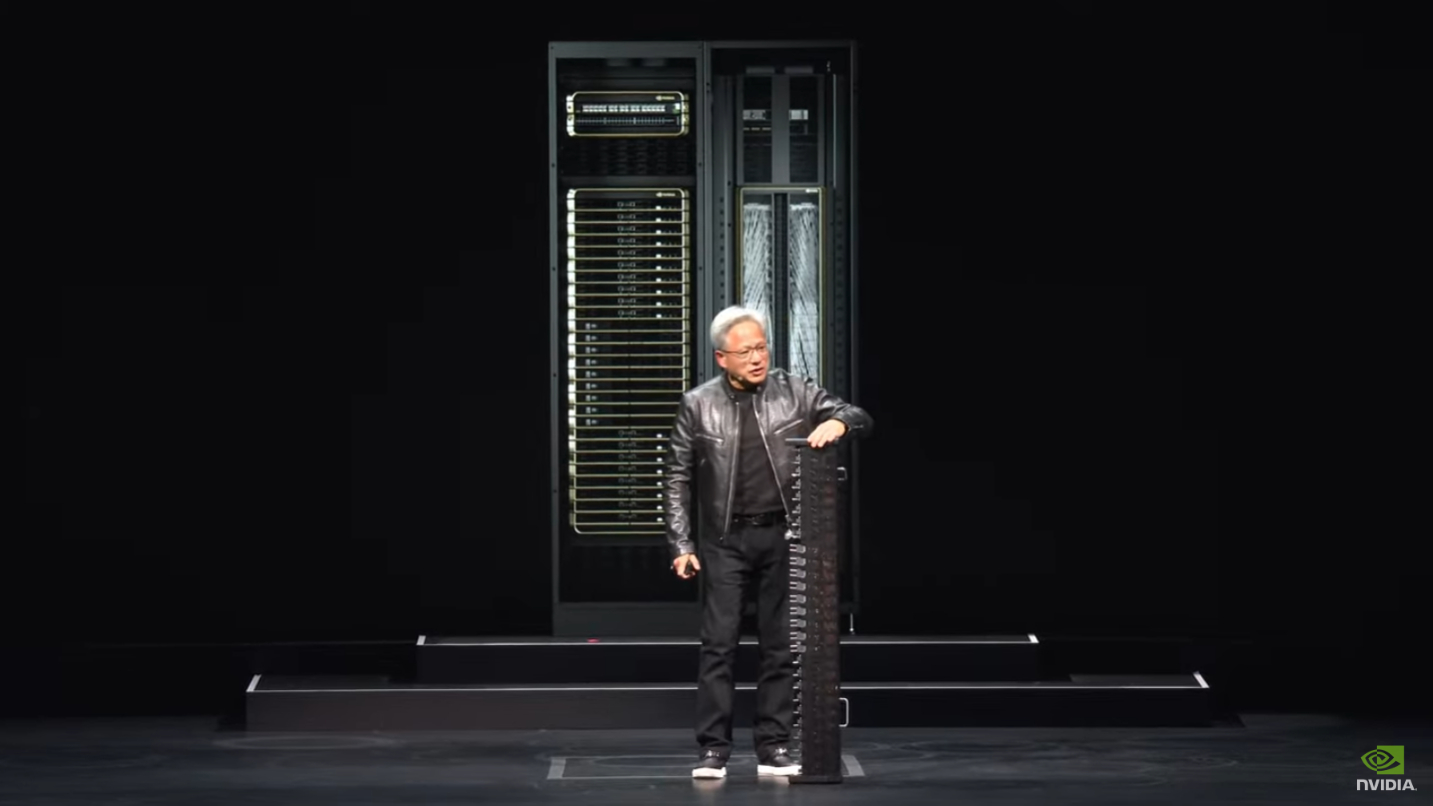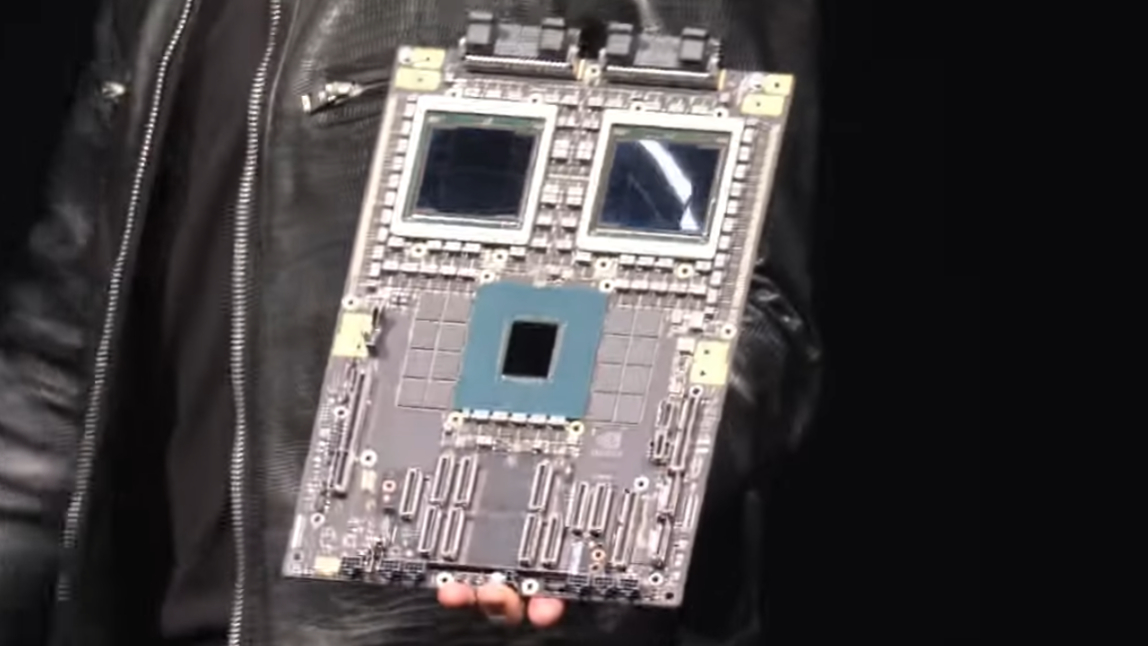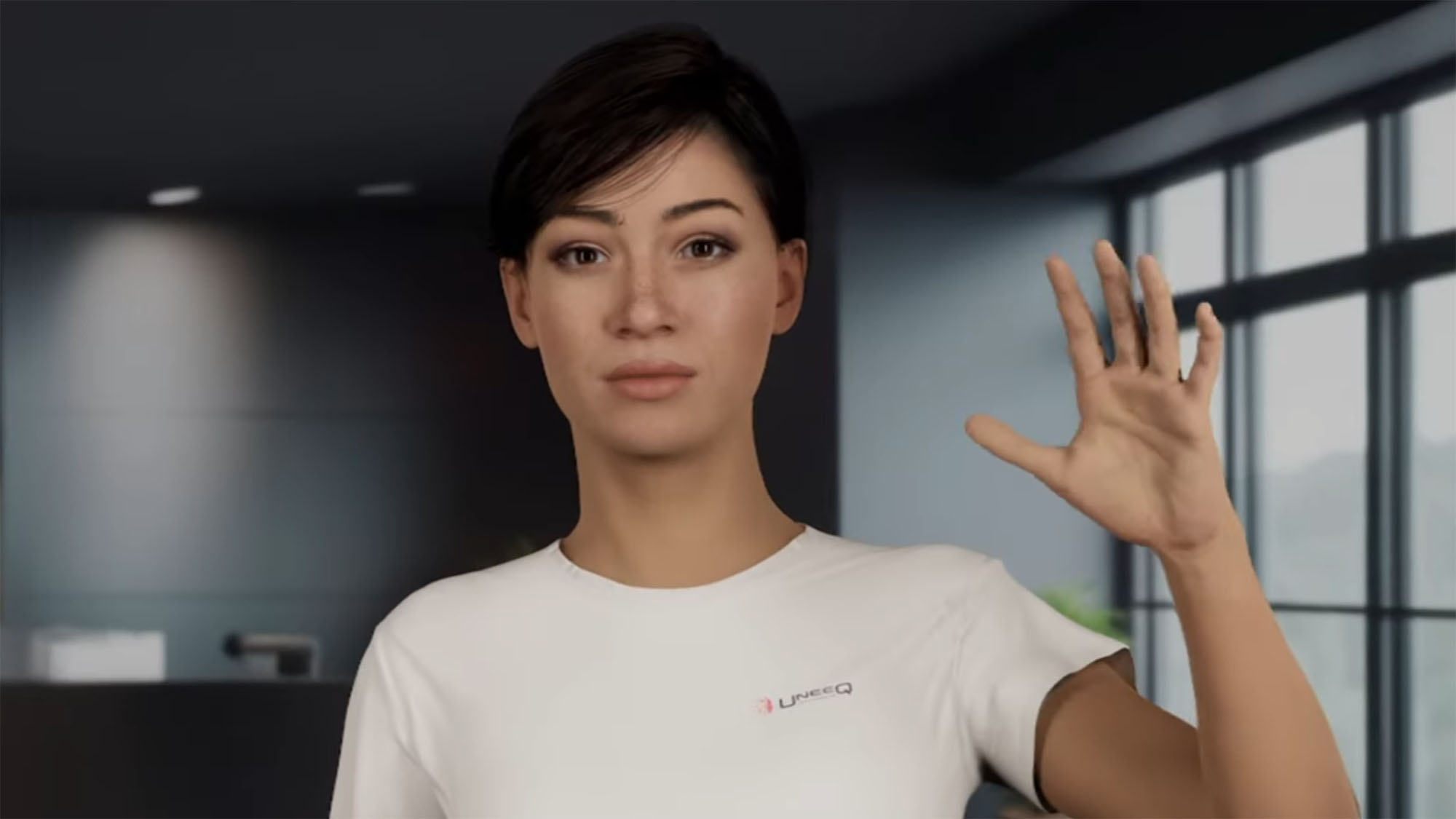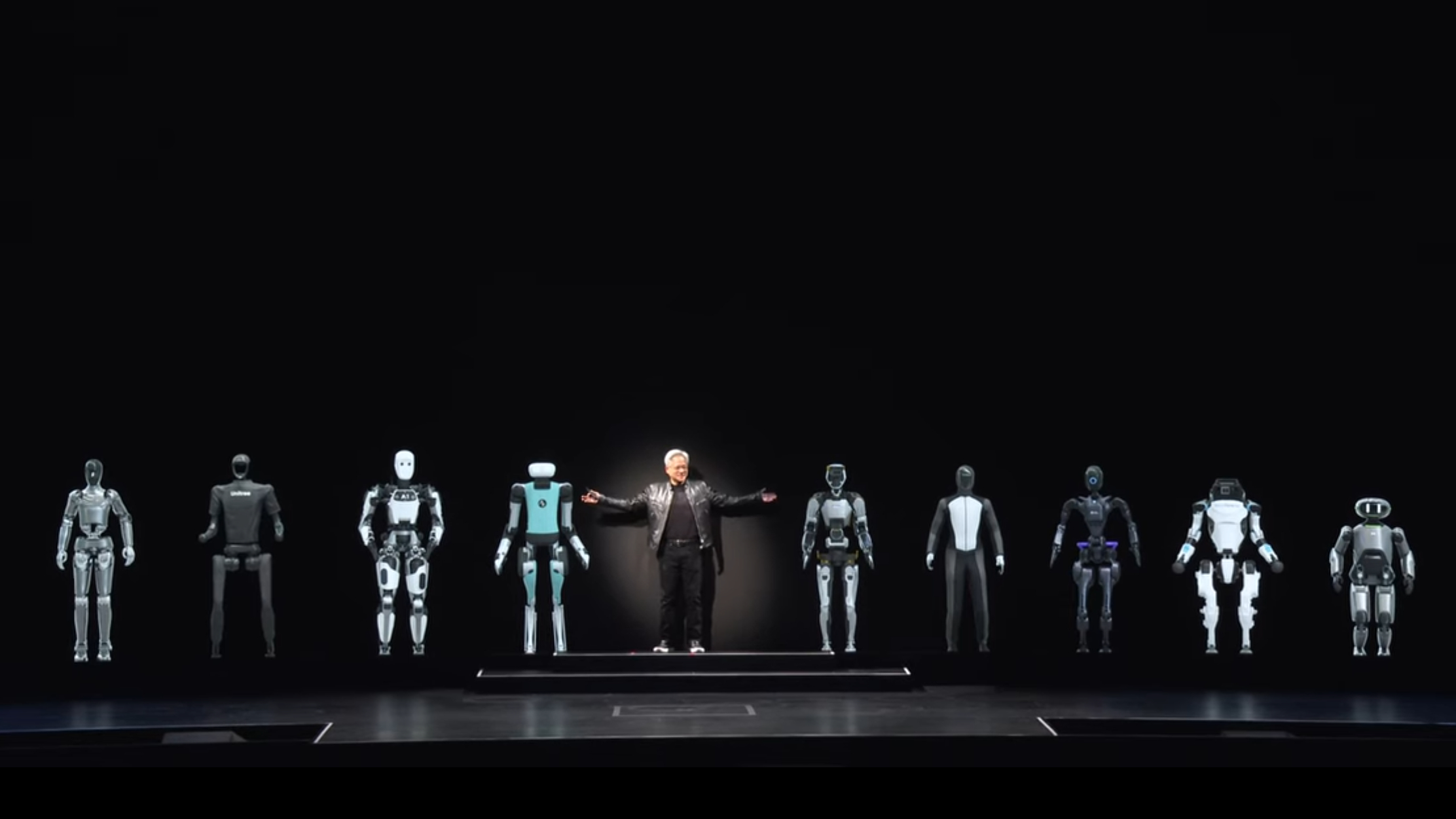I watched Nvidia's Computex 2024 keynote and it made my blood run cold
Nvidia's pre-Computex keynote address was certainly something, and none of it felt good.

I don't think Nvidia CEO Jensen Huang is a bad guy, or that he has nefarious plans for Nvidia, but the most consequential villains in history are rarely evil. They just go down a terribly wrong path, and end up leaving totally forseeable, but ultimately inevitable ruin in their wake.
While the star of the show might have been Nvidia Blackwell, Nvidia's latest data center processor that will likely be bought up far faster than they can ever be produced, there were a host of other AI technologies that Nvidia is working on that will be supercharged by its new hardware. All of it will likely generate enormous profits for Nvidia and its shareholders, and while I don't give financial advice, I can say that if you're an Nvidia shareholder, you were likely thilled by Sunday's keynote presentation.
For everyone else, however, all I saw was the end of the last few glaciers on Earth and the mass displacement of people that will result from the lack of drinking water; the absolutely massive disruption to the global workforce that 'digital humans' are likely to produce; and ultimately a vision for the future that centers capital-T Technology as the ultimate end goal of human civilization rather than the 8 billion humans and counting who will have to live — and a great many will die before the end — in the world these technologies will ultimately produce with absolutely no input from any of us.
The fact that Jensen Huang treated the GeForce graphics card, the product that defined Nvidia for two decades and set it up for the success it currently enjoys, with such dismissiveness and disregard was ultimately just the icing on a very ugly cake.
Nvidia Blackwell is nothing short of a doomsday device

There was something that Huang said during the keynote that shocked me into a mild panic. Nvidia's Blackwell cluster, which will come with eight GPUs, pulls down 15kW of power. That's 15,000 watts of power. Divided by eight, that's 1,875 watts per GPU.
The current-gen Hopper data center chips draw up to 1,000W, so Nvidia Blackwell is nearly doubling the power consumption of these chips. Data center energy usage is already out of control, but Blackwell is going to pour jet fuel on what is already an uncontained wildfire.
Worse still, Huang said that in the future, he expects to see millions of these kinds of AI processors in use at data centers around the world.
Sign up for breaking news, reviews, opinion, top tech deals, and more.
One million Blackwell GPUs would suck down an astonishing 1.875 gigawatts of power. For context, a typical nuclear power plant only produces 1 gigawatt of power.
Fossil fuel-burning plants, whether that's natural gas, coal, or oil, produce even less. There's no way to ramp up nuclear capacity in the time it will take to supply these millions of chips, so much, if not all, of that extra power demand is going to come from carbon-emitting sources.
I always feared that the AI data center boom was likely going to make the looming climate catastrophe inevitable, but there was something about seeing it all presented on a platter with a smile and an excited presentation that struck me as more than just tone-deaf. It was damn near revolting.
'Digital humans' are on the agenda, too

When I saw Nvidia ACE at CES 2024, I was genuinely impressed by the potential for this technology to make video games feel more dynamic and alive. I should have known that we're far more likely to see Nvidia ACE at the checkout counter than in any PC games any time soon.
In one segment of the keynote, Huang talked about the potential for Nvidia ACE to power 'digital humans' that companies can use to serve as customer service agents, be the face of an interior design project, and more. This makes absolute sense, since who are we kidding, Nvidia ACE for video games won't really make all that much money.
However, if a company wants to fire 90% of its customer service staff and replace it with an Nvidia ACE-powered avatar that never sleeps, never eats, never complains about low pay or poor working conditions, and can be licensed for a fee that is lower than the cost of the labor it is replacing, well, I don't have to tell you how that is going to go.
Next time you go into a fast food restaurant to order from a digital kiosk, your order will probably soon come out of a hole in the wall with a 'digital human' on a screen to pretend that it's actually serving you your food. Behind the wall, an army of robots, also powered by new Nvidia robotics processors, will assemble your food, no humans needed. We've already seen the introduction of these kinds of 'labor-saving' technologies in the form of self-checkout counters, food ordering kiosks, and other similar human-replacements in service industries, so there's no reason to think that this trend won't continue with AI.
Nvidia ACE may ultimately be the face of the service industry in a decade, and all those workers it will replace will have few options for employment elsewhere, since AI – powered by Nvidia hardware – will be taking over many other kinds of work once thought immune to this kind of disruption.
Where does that leave all these human beings, with lives, families, financial obligations, and everything else that comes with being human? That, ultimately, just isn't Nvidia's, or OpenAI's, or Google's problem. No, that will be your problem.
This is the problem when you center technology instead of humanity

I'm going to give Huang and all the other tech CEOs with their foot on the gas of the AI data center boom the benefit of the doubt here and say that this isn't about pure greed at the end of the day. Let's say that all of these visionary leaders, our economic elite, are just so excited about the potential of this technology that they cannot help themselves. They have to see it through, regretting the costs incurred by others along the way to an ultimate greater good sometime in the future.
There are plenty of 'tech optimists' or even 'tech utopians' who earnestly believe that the ultimate good these AIs will do simply outweigh the pain that this transition brings with it. After all, technological progress always disrupts — the tech industry's favorite word — the status quo, and people have always adapted in the past, so they will do so again. It's for our own good, in the end.
Well, not our own good, but maybe our kids or our grandkids, or a little further down the line. Eventually, it will get itself sorted out. Tragic that we have to go through it all though, but it can't be helped. Progress marches on.
The problem with this kind of thinking, as it was with the first Industrial Revolution, is that this treats people as obstacles to be cleared away. Climate change will disrupt entire continents in ways impossible for us to understand, it's simply too big.
When the Himalayan mountains lose the last of their glaciers, as they are on course to do in the next hundred or so years, the drinking water for an entire subcontinent of nearly two billion people disappears. All of these people will have to leave their homes if they're lucky enough to be able to do so, or die of thirst. An entire civilization will be uprooted, with all its history, landmarks, holy places, and more left behind in what will eventually become a desert.
Those people's lives matter. They have worth. Their history, culture, and way of life matter. It's not unfortunate but inevitable what's happening to them. It's an active choice by men (they are almost always, 99% of the time, men) who simply close their eyes to the consequences of their choices — if they even look at them at all.
Further down the hierarchy of needs, people's jobs matter. Having purpose in our work matters, and being able to take care of our families matters. A universal basic income won't even paper over this disruption, much less solve it, especially because the ones who will have to pay for a universal basic income won't be the enormous pool of displaced workers, it would be those same tech titans who put all these people out of work in the first place.
We can't even get the rich to pay the taxes they owe now. What makes anyone think they'll come in and take care of us in the end, no strings attached?
More likely, they will just wall themselves off from us and leave us to fend for ourselves, which is how the first Industrial Revolution went. With all this talk of a new Industrial Revolution on the horizon, it would serve us all well to go back and look at just how miserable that time was for just about everyone involved.
I think the worst part of Huang's keynote wasn't that none of this mattered, it's that I don't think anyone in Huang's position is really thinking about any of this at all. I hope they're not, which at least means it's possible they can be convinced to change course. The alternative is that they do not care, which is a far darker problem for the world.
- Follow all the latest news out of Computex 2024 to stay up to date with everything going on in Taipei
YOU MAY ALSO LIKE...

John (He/Him) is the Components Editor here at TechRadar and he is also a programmer, gamer, activist, and Brooklyn College alum currently living in Brooklyn, NY.
Named by the CTA as a CES 2020 Media Trailblazer for his science and technology reporting, John specializes in all areas of computer science, including industry news, hardware reviews, PC gaming, as well as general science writing and the social impact of the tech industry.
You can find him online on Bluesky @johnloeffler.bsky.social